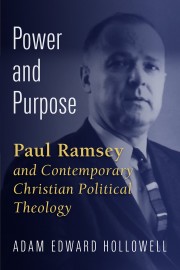Reviewed by Jacob Shatzer
Adam Edward Hollowell serves as adjunct professor at the Sanford School of Public Policy at Duke University and director of student ministry at Duke University Chapel. This book is a revision of Hollowell’s doctoral dissertation, completed under Oliver O’Donovan at the University of Edinburgh. At the start he observes that “Not long ago, Paul Ramsey was the leading voice in Christian ethics in North America…. Today, Ramsey’s intellectual legacy is in question” (1). Hollowell sets out to remedy this problem, demonstrating why Ramsey’s diminished influence is due to various misunderstandings of Ramsey’s work and how reading Ramsey as a political theologian is the best route to remedying this problem.
Two overall approaches to Ramsey in the secondary literature have led to his declining influence. First, many wrongly treat Ramsey predominantly as a casuist and distinguish too sharply between his theology and his ethics. Second, a sharper critical edge has led to suggesting that Ramsey neglects certain theological resources or prioritizes non-theological influences (5).
Hollowell remedies these misunderstandings in three main moves, which correspond to the three sections of the book. In the first, he rehabilitates certain features of Ramsey’s work—his emphasis on covenant, the importance of repentance, and the way Scripture informs ethics—to call into question whether criticisms of Ramsey’s work are fair. In the second section, he focuses on particular debates Ramsey participated in, including situation ethics and questions on just war, to draw out the theological resources Ramsey used. Finally, in the third section, Hollowell brings Ramsey into contemporary Christian ethics by showing how his work would speak into a variety of topics. Here he draws on the work of John Bowlin, Jennifer Herdt, Charles Mathewes, Eric Gregory, and Daniel M. Bell Jr. In doing so, Hollowell shows Ramsey’s key role in the recovery of virtue thinking, his influence on current turns to Augustine for political thought, and the continued relevance of his understanding of the just war tradition, even in light of recent work focusing on Christian discipleship.
Hollowell’s work displays several strengths. First, he treats Ramsey’s works in a nuanced way that observes and takes into account key shifts and differences. This treatment enables Hollowell to argue convincingly why Ramsey’s thought can continue to apply to contemporary political theology. Second, the book takes into account Ramsey’s correspondence to press beyond insights from published works. It includes letters to ethicists such as Stanley Hauerwas that illustrate the way Ramsey conceived of his own work and changes in his thought over his career. Third, Hollowell competently draws various contemporary thinkers into dialogue with Ramsey. This requires not only a firm grasp of Ramsey’s work and its development, but also of a variety of specialized areas, including virtue ethics, current Augustinian influences, and emerging debates on Christian just war.
The main weakness of the work is the level of familiarity it presupposes. Those unfamiliar with Ramsey and the various contemporary debates Hollowell adjudicates can still gain something from the work, but the work is best accompanied by more general treatments of Ramsey and a working knowledge of the contemporary landscape of Christian political theology. The book could have provided more summary to draw readers more closely into these debates.
Hollowell succeeds in his goal: he demonstrates the relevance of Ramsey for Christian political theology today and highlights areas where continued scholarship on Ramsey’s work may yield the most fruit. This book is a must read for anyone interested in Ramsey, secondarily to those interested in the particular topics and dialogue partners Hollowell chose. It is particularly appropriate for college or graduate courses focusing on the development of twentieth-century ethics and on Christian political theology.
Jacob Shatzer is Assistant Professor of Biblical and Theological Studies Sterling College and Book Review Editor for Ethics here at Books At a Glance.
Buy the books

Power And Purpose: Paul Ramsey And Contemporary Christian Political Theology